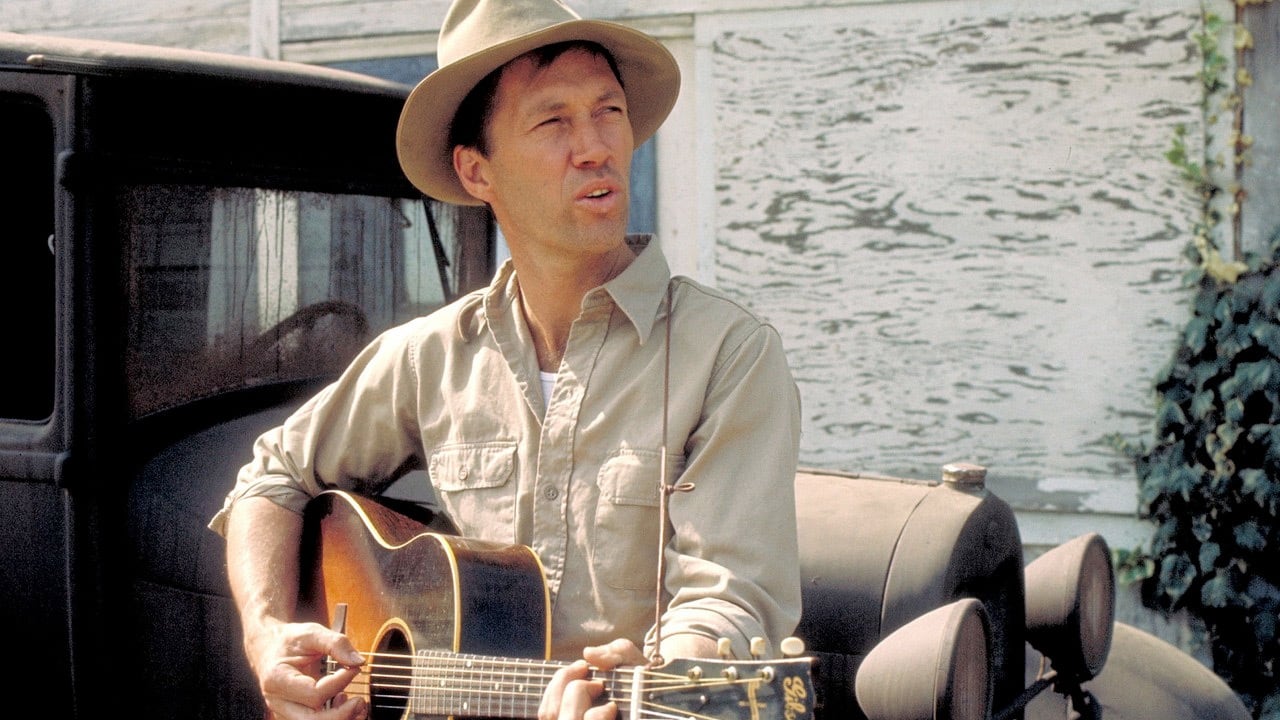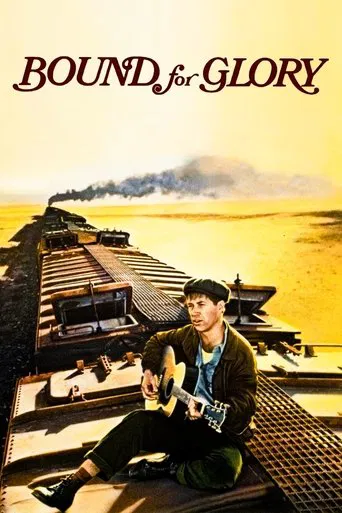

Your blood may run cold, but you now find yourself pinioned to the story.
... View MoreI didn’t really have many expectations going into the movie (good or bad), but I actually really enjoyed it. I really liked the characters and the banter between them.
... View MoreThis is a coming of age storyline that you've seen in one form or another for decades. It takes a truly unique voice to make yet another one worth watching.
... View MoreThe movie is wonderful and true, an act of love in all its contradictions and complexity
... View MoreThis biopic starts in 1936. Woody Guthrie (David Carradine) is struggling in the dusty small town of Pampa, Texas with his wife Mary (Melinda Dillon). Jobs are hard to find and everybody is looking to leave for California. He runs off to ride the rails and becomes one of the most influential folk singers.This is limited in excitement and tension. It's a quiet easy movie. It's quietness takes away some of the emotions in the movie. David Carradine is putting in a simple nice guy performance. There are some inventive camera work using the new steadycam. The look of the movie is one of faded dusty postcard. It's a pretty and interesting movie to look but it's not much more than that. It's a long winding road.
... View MoreWhile a written biography may cover its subject's life from beginning to end over hundreds of pages, a biopic that lasts only two or three hours simply does not have the time to do the same. And yet the best biopics do justice to an individual's life by offering a slice of their existence, giving an impression of who they were and what they did. Bound for Glory covers only a few years in Woody Guthrie's life, and yet the portion it covers is a transitional one, showing his change from a friendly, easygoing country boy, to a man more cynical but firmly politicised, with his emotions shaken but his core honesty intact, and his career on the verge of national fame.A good biopic is often as much about tone as story, and this requires a good director. Consummate 70s filmmaker Hal Ashby is perfect for the project. His style is just so wonderfully light and tentative. He won't force an idea upon you, but he'll give you time to notice some little snippet of life which adds texture to a scene, for example a split-second shot that reveals one of the hobos being pulled off the train has only one arm. There's a lot of darkness in this movie, a lot of enclosed spaces and shuttered windows. The countryside appears achingly beautiful, but it is only fleetingly glimpsed, over the top of a railway carriage or through a gap in the swirling dust, like some unattainable paradise. The sublime cinematography of Haskell Wexler picks out every mote of dust and finds shape and definition in the swathes of black and brown.Let's give a word a two now to lead man David Carradine. Carradine has long been one of my favourite actors, even before he was in Kill Bill and everyone had heard of him. He worked mostly in TV and B-Westerns before landing this, his greatest and most apt role, the one he seems born to play. He has no ego. He doesn't play to the camera, and yet he has such presence here, such charisma. He thereby gives a good account of the real Woody, as well as giving us the impression of a life being lived rather than a performance being played. And of course being a proper folk musician he can do the songs justice.And the songs are crucial to this adaptation. Bound for Glory works much like a semi-musical King Vidor movie from nearly fifty years earlier by the name of Hallelujah. All the music is diagetic – it makes sense within the scene, and yet it is used to comment upon the narrative and move it forward, just as a true musical does. When Woody decides to leave his dustbowl home, he never actually states his intention to do so in dialogue, but we hear him singing a lose version of "So Long, It's Been Good to Know You" with its appropriate line about "dusty old dust", which is then picked up in instrumental form as he heads out of town. Later, the scene of Woody playing I Ain't Got no Home in the radio studio segues into a shot of workers in a field as the tune continues, linking the man and his music to their social context. The songs are never merely presented while the story takes a break, the songs exist alongside and become part of story. Bound for Glory does not just show the life of a musician, it shows a musical life.
... View MoreFor realistic images of the 1930s dust bowl in Oklahoma and Texas, this is the film to see ... the shabby, frame houses, the dilapidated autos, the dreary clothes, the grinding poverty, and all that dust. Although the film was shot in color, the lighting is muted, even in daylight. I suspect that was on purpose, to show how the dust blotted out much of the sunlight, and thematically much of the optimism."Bound For Glory" is the story of folksinger Woody Guthrie (David Carradine), whose life as a sign painter and hobo during tough times led him to write many songs, the most famous being "This Land Is Your Land". The story begins in Texas, with Woody already married and with children. Eventually, all that dust and dreariness causes him to forsake his wife and kids, as he hitchhikes and rides the rails westward to the promised land.But the promised land doesn't want any more Okies. And Guthrie ends up eating in free soup kitchens and living in ugly migrant worker camps. He writes music about life as a poor man. He identifies with the problems of migrant workers, stuck with poverty wages, if they're lucky enough even to get a job. He and them resent the cruelty of their arrogant bosses and rich, powerful corporations, which leads him to write songs of protest.Despite the film's lengthy run-time, only a small part of Guthrie's life is shown here. We never learn anything about him once he becomes famous. Nor do we learn anything about his upbringing in rural Oklahoma. The film is more of a year-in-the-life-of, rather than a comprehensive bio."Bound For Glory" looks good, visually, with terrific period piece production design and costumes. And the cinematography is impressive. But the plot pace is very, very slow and deliberate. Everything is understated. And not until the film's end do we get to hear his most famous song. David Carradine is reasonably persuasive as Guthrie. Other performances are fairly standard.For all the great visuals, the script is somewhat of a letdown. I would have preferred a more conventional biography, with a faster clip. As is, genuinely certified fans of Woody Guthrie are the only viewers likely to have the patience and forbearance to sit through this toilsome and sluggish, though realistic, story.
... View MoreIf you would've asked me, what I thought of the movie, right after I saw it, I would've probably gave it a lower rating. But the movie grows on you. Carradine's performance is mesmerizing to say the least and his underdog is more than likable. You can see that he has his priorities straight, even if they get him in all sorts of trouble, be it at home or at work.The problem of the movie is, that it tries so hard to depict a historical character in a short period of time. Well "short" might be a stretch here, seeing that the pace of the movie itself is pretty slow, which make you think, the movie is longer than it actually is. Not really much is happening and the same issues get played twice or more times, with almost the same conclusion. The stoic Carradine character remains the same. This might be truthful (I can't say, because I haven't read any bios on the real man portrayed here), but could also become boring after awhile for quite a few people.
... View More